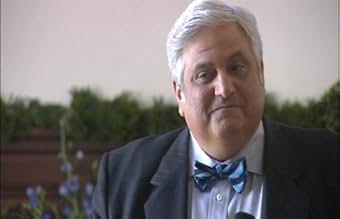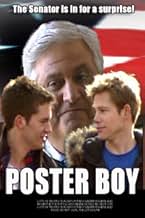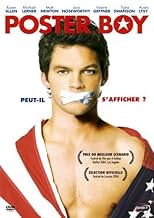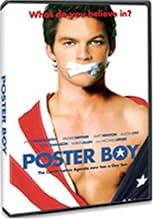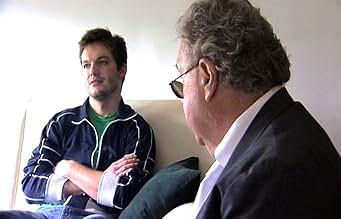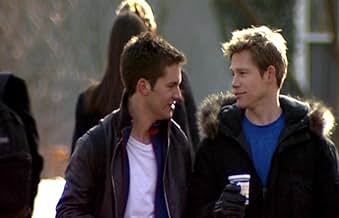With the help of a hot, slightly older new acquaintence (Noseworthy), the closeted son (Newton) of a conservative U.S. Senator (Lerner) puts a shocking spin on his dad's re-election campaign... Read allWith the help of a hot, slightly older new acquaintence (Noseworthy), the closeted son (Newton) of a conservative U.S. Senator (Lerner) puts a shocking spin on his dad's re-election campaign.With the help of a hot, slightly older new acquaintence (Noseworthy), the closeted son (Newton) of a conservative U.S. Senator (Lerner) puts a shocking spin on his dad's re-election campaign.
- Director
- Writers
- Stars
- Awards
- 1 win & 2 nominations total
- Skip Franklin
- (as Ian Kessler)
- Director
- Writers
- All cast & crew
- Production, box office & more at IMDbPro
Featured reviews
Some other users have commented on the movie not being multi dimensional, but I think that the way that the characters reacted are pretty realistic, and most people (generally) are multi dimensional but may only show one side of their selves for one reason or another, and don't forget that this movie is focused from the point of view of Henry Kray. It also has many plot twists, and though it has be commented upon that it is too predictable, I thought nothing of the sort. The characters are oddly unpredictable, and are like multi layered onions, many people might just look it and observe that is it just another gay movie, but it is not, it is so much more than that.
Matt Newton plays Henry Kray, the college boy son of Jack Kray, an outspoken conservative senator facing a re-election vote. The son is gay and very much in the closet -- though apparently quite sexually active; while the father is a "family values" candidate with a history of particularly harsh and homophobic stands on various issues. The clueless Jack bullies Henry into being active in his re-election campaign as a way of reaching out to younger voters.
This is a great start; especially if you add in a plot twist wherein Henry unknowingly has a one-night stand with Anthony, a gay rights activist who has a particularly strong dislike for Senator Jack, his politics and his political party. Henry finds himself caught between a father who wishes to exploit his son's youthful and apparently straight-arrow image and a lover who hopes to out him in a cheap attempt at embarrassing the father. This is a nice set up for a potentially complex drama, maybe even an intriguing thriller.
Making an admirable effort to establish an Altmanesque feel to the film, director Tucker finds his attempts at realism at odds with the script that seems contrived and phony as the screenwriters fumble the material in infuriatingly inept ways. For one thing, as played with a perpetual snarl by Michael Lerner, Sen. Jack Kray isn't just a conservative, the story goes out of its way to make sure we know that he is (and by extension, all conservatives are) controlling and hypocritical and poor at parenting to boot. He isn't just a conservative, he is "the Nazi of North Carolina" whose campaign seemingly is financed by the tobacco industry. Gay issues aside, it is not surprising that Henry has great animosity toward his dad. And that is the problem: The film quells part of its strongest source of drama from scene one by obliterating even the slightest suggestion of there being a genuine loving bond between father and son. Indeed, the entire film is told via flashbacks as Henry spills his guts to a reporter in what seems to be a spiteful attempt to get back at his father.
The film would be much more powerful had Henry been torn between two loves; one, his familial love of his father, and the other, his sexual attraction to his lover. The film would be so much more compelling (and believable) if Senator Kray were to be basically a good man with extreme beliefs or if Henry were to be a true believer in his father's politics, who had to face how it conflicts with the reality of his own sexuality. Or what if Sen. Kray were a liberal whose politically correct rhetoric masks a homophobic mind? And though Anthony and his fellow activists aren't shown in a particularly flattering light either, the story overly stacks the deck to the left by making Senator Kray an oh-so obvious right-wing villain in a tired attempt to make clear the film's already obvious left-leaning bias. The result is weak propaganda and even weaker drama.
Worse, all the cheap political shots detract from the film's strongest relationship, between Newton's Henry and Jack Noseworthy's Anthony. Both actors give fine performances, helped considerably by the fact they are given the most realistic characters to play. Newton captures the anxiety of Henry, a guy who just wants to live his life out of the public eye, but finds the comfort that comes from living in the closet comes at a high price. Noseworthy makes credible a character who can't quite separate his sexuality from his politics, which, ironically, is the problem with the film itself. The film's most potent message would have been in exploring this love story rather than in focusing on all the yammering political noise that surrounds these two men.
Why I Gave It 7 Stars: It was a solid 6, leaning towards 8 in the beginning, and towards the end, so I compromised. A solid B- film you might say.
The Story: It centers around Henry (played by Matt Newton). Henry is the son of a ultra conservative Senator from the south. Think of "The Birdcage", minus anything to laugh at. Henry is also gay. The film, told in "flashback style" as Henry tells his story to a reporter unfolds over the course of 6 months. Basically, Henry comes out, and family chaos follows. But not for long, as we're almost to the end of the film.
What I Liked: Personally, I liked the edge. This was almost more of a docu-drama, albeit a fictitious one, which could easily be based on truth. The actors were good to very good, the overall production was good as well.
What I Did Not Like: I was nearly half-way through the film, starting to get concerned where it was going, before all the character/story sub-plots were connected. The second half of the movie was strongest.
The Rest of the Characters: Besides our lead, Henry, we also focus on his stereo-typical bigot Republican Father/Senator, and his "senator's wife" Mother. And to the mix, a straight girl Izzi, and her gay male friend Anthony, whose relationship was unusual at best. Anthony and Henry meet under some unusual circumstances at a college party.
The Ending: I never give away specifics, but let's just say it's not a "Brady Bunch" wrap-up. If the ending was all tidied up for viewers, I would have knocked this down to a 5 or 6. Everything about the film was somewhat gritty, dark, "off". It's not the type of film that usually comes out of the USA. We usually have to watch films like this with sub-titles, so kudos to Here! films and those involved for producing the film.
Final Thoughts: This is not a laugh-out-loud sex romp. No, not at all. It's a good story trying to make a point about politics, sexuality and family values. It does all of those well.
Unrelated Chatter: Jack Noseworthy, the actor who played Anthony also starred in "The Brady Bunch Movie" and in his early years, "Cats" in the theater. Matt Newton (Henry) has appeared on the "Gilmore Girls" and "Judging Amy".
The story itself is rather simple. Through the gimmick of a confession to a reporter we meet handsome young Henry Kray (the talented Matt Newton), gay since early teens but electing to keep his private life a secret, who is the son of Senator Jack Kray (Michael Lerner) and his lovely but docile wife Eunice (the fine Karen Allen). It seems that six months prior to the time we are invited into the conversation Henry met Anthony (hunky Jack Noseworthy) whose roommate is HIV positive Izzie (Valerie Geffner). Henry and Anthony have a one-night stand the day before Jack Kray is to give a speech for re-election at Henry's college. The Senator accidentally hits Izzie with his car and Eunice insists Izzie stay with them in their suite where the two women bond. Meanwhile Henry's night with Anthony makes him late for the speech, but a talk to Henry from Jack before the speech telling him what to say (Jack is the best father, loves family values, etc) sticks in Henry's throat and soon after he obeys his father's wishes for the speech introduction, Henry turns to his table partner Anthony and the two kiss openly as the Senator is addressing the crowd - all caught by the media of course.
How this moment of honesty alters the lives of everyone around is the crux of the ending. Not a bad tale, but the camera work is so patchy and disconcertingly disconnected that it defies the viewer to keep the storyline straight. But if the viewer can keep up visually, the performances by the cast are well worth attention. There is some very fine talent on the screen of this B movie! Grady Harp
What makes this particularly interesting is that it is a far cry from other gay films out there. It isn't a love story, it doesn't try to woo in the punters by having stunningly handsome men who go full frontal or through strong sex scenes. That isn't what this is about. It has a message, though, and some of the scenes are a little clunky (especially the linking sections with the journalist), but that's a small price to pay for a good solid story that is well told.
The two young actors play the leads without making them into stereotypes and there isn't a screaming queen in sight. Thankfully. What makes the two protagonists most appealing is that neither of them are perfect human beings. The senator's son is cocky and arrogant at times, and the boy he meets has his own faults. The supporting cast is also very good, with some nicely drawn characters.
For a low budget gay effort, this is really good stuff.
Did you know
- GoofsWhen Henry and Anthony are walking through the campus, Henry points out one of the girls walking ahead of them. Seconds later, you can clearly see her as an extra in the background.
- Quotes
Henry Kray: [to Jack] What am I part of, Jack? An issue? Don't you get it? Issues are what they use to divide us. Sexual orientation, race, gender... All issues that don't actually pertain to anyone except those being cut out and thrown away by the issue. Does it really matter to some farmer in Kansas whether or not two men get married in Vermont? But see, they need us to choose sides. They create these issues for us to cling to, to grasp at. You know they separate us into these divisions: Black, White, Gay, Straight, Rich, Poor. Blame it Christian, Liberal, Democrat, Conservative. Split. Different. Opposed. How can a cause be just if it puts people against each other?
- ConnectionsReferences The Wizard of Oz (1939)
- How long is Poster Boy?Powered by Alexa
Details
Box office
- Gross US & Canada
- $62,062
- Opening weekend US & Canada
- $3,806
- Aug 13, 2006
- Gross worldwide
- $62,062


